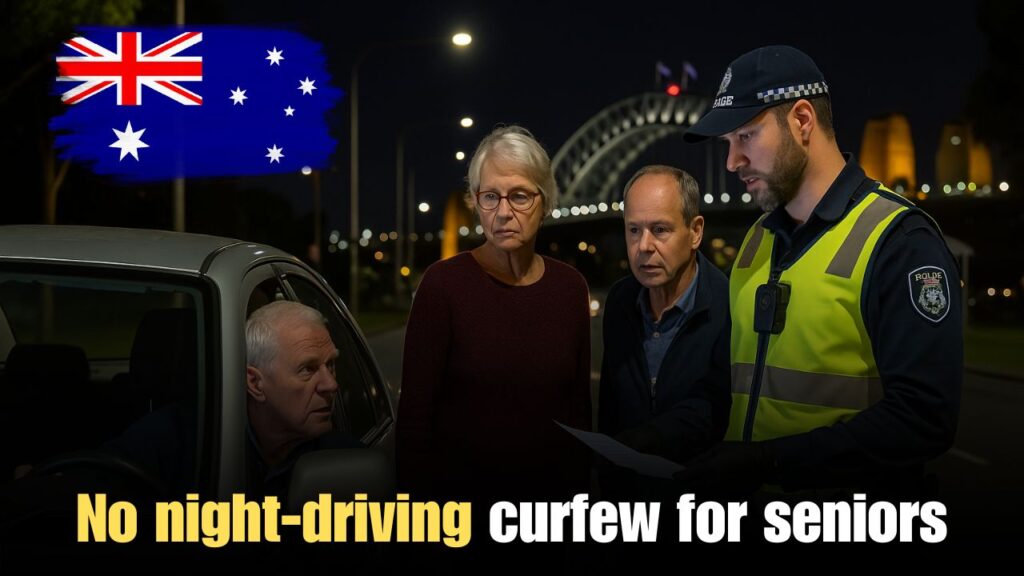Australia has announced a new regulation introducing a night driving curfew for senior citizens aged over 60, beginning in 2025. This rule aims to enhance road safety by reducing the risk of accidents that commonly occur during nighttime hours. Authorities claim that this change will primarily impact senior drivers who hold full or restricted licences. While the move has raised discussions about its fairness and practicality, the Australian government insists it’s a proactive step to protect both elderly motorists and other road users under the upcoming road safety reform.

Understanding Australia’s New Night Driving Curfew for Seniors
The Australian transport department has confirmed that the night curfew applies between 10 PM and 5 AM, restricting driving hours for individuals aged 60 and above unless they have medical clearance. The goal is to reduce accident rates linked to night vision decline and slower reaction times among seniors. Enforcement will begin with warnings before stricter penalties are applied. This new policy reflects growing concerns around elderly driver safety and the importance of ensuring road fitness in an ageing population. Community feedback remains divided, but many acknowledge its long-term safety benefits.
Who Will Be Affected by the Night Driving Restrictions
According to the Commonwealth transport authorities, the rule will affect more than 1.3 million Australian citizens aged 60 and above who drive regularly. Those who rely on their cars for night shifts or emergency travel will need to apply for a curfew exemption permit. Medical assessments and vision test reports will play a critical role in determining eligibility for these exemptions. The curfew does not apply to professional or emergency service drivers. In the coming months, the government plans to release a detailed enforcement guideline for each state and territory.
How the Enforcement and Penalty System Will Work
From early 2025, enforcement of the senior curfew policy will be handled by local police and automated number plate recognition systems. Any breach of the curfew could result in a $250 on-the-spot fine or three demerit points added to the licence. In repeat cases, drivers may face temporary suspension. To ensure fairness, the system will allow drivers to submit appeal forms online with valid reasons such as medical emergencies. The Australian states of Victoria, Queensland, and New South Wales are among the first to begin implementation in a phased approach throughout 2025.
Implementation Timeline and Key Details
The nationwide rollout of the curfew will start in April 2025 and continue until November. Training sessions for law enforcement officers and awareness programs for senior drivers will take place before full enforcement. The Australian Road Safety Authority has urged elderly drivers to renew their medical fitness certificates before March 2025 to avoid penalties. Additionally, rural communities with limited public transport options may receive special consideration. The curfew forms part of a larger road safety modernization plan that prioritizes accident prevention and responsible mobility for all citizens.
| Age Group | Curfew Hours | Permit Required | Penalty for Violation | Effective Date |
|---|---|---|---|---|
| 60–65 years | 10 PM – 5 AM | Medical Certificate | $250 fine | April 2025 |
| 66–70 years | 9 PM – 5 AM | Exemption Permit | $250 + 3 points | June 2025 |
| 71–75 years | 9 PM – 6 AM | Medical Clearance | Suspension risk | August 2025 |
| 76+ years | 8 PM – 6 AM | Mandatory Check | Licence review | November 2025 |
FAQ 1: When will the senior driving curfew start in Australia?
The curfew will start rolling out from April 2025 across all states.
FAQ 2: Who is exempt from the night curfew?
Drivers with valid medical or emergency exemptions will be allowed to drive at night.
FAQ 3: What penalties apply for breaking the curfew?
Violators may face fines up to $250 and three demerit points.
FAQ 4: Will this rule apply nationwide?
Yes, it will be implemented across all Australian states in phases during 2025.






